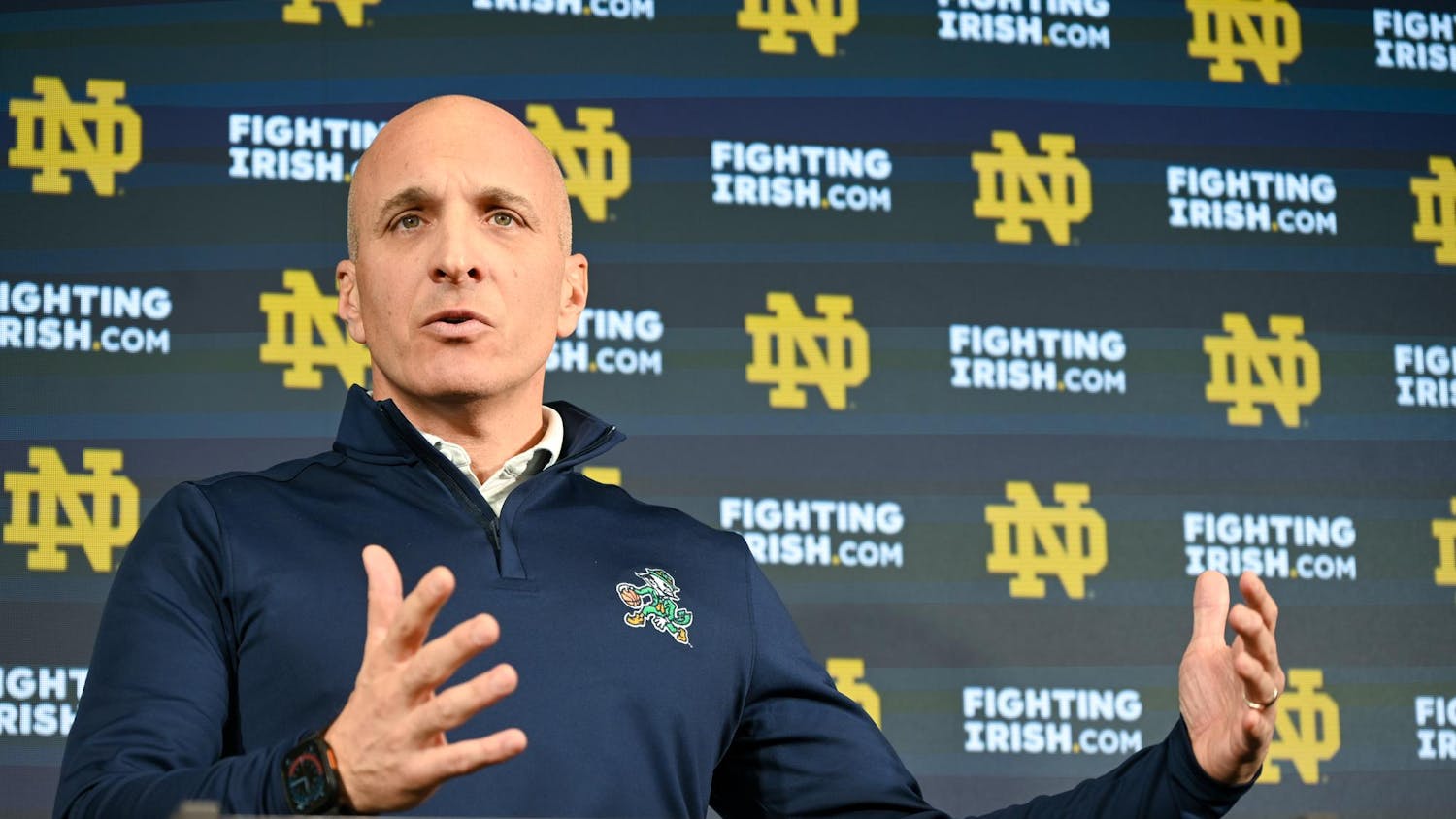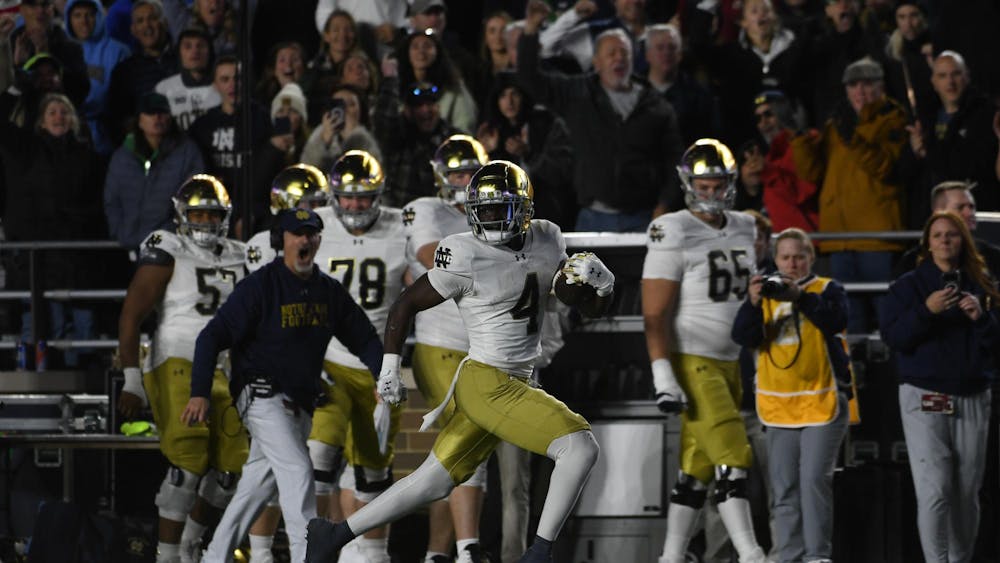When you’ve achieved the type of success that the Notre Dame hockey team and head coach Jeff Jackson have during Jackson’s 15-year tenure with the team, every season is met with lofty expectations and goals of reaching the national championship game.
The Irish entered the 2019-2020 hockey season two years removed from a 2-1 loss to Minnesota-Duluth in the National Championship and fresh off of back-to-back Big Ten Tournament championships in their first two seasons in the conference. In the previous four seasons, Notre Dame had advanced to two straight Frozen Fours, three straight NCAA Regional Finals and four straight NCAA Tournament appearances. Thus, when the team finished this season 15-15-7 overall and 9-9-6 in the Big Ten after a first-round exit in the Big Ten Tournament quarterfinals to Minnesota, there seemed to be little to celebrate.
“I don't want to say it was a disappointing season because we had a good group, a strong team,” Jackson said. “From a performance standpoint, though, I thought we had a disappointing year. But from a cultural standpoint, I didn’t feel like there were any issues off the ice. Our guys did a great job in the classroom, they were good citizens and they did a good job in the community. There were a lot of positives, but our performance on the ice was very inconsistent and when you lack consistency, that certainly has an impact on your confidence.”
After starting the season 8-0-1, the Irish lost six straight and eight of their last 10 games heading into winter break and never seemed to recover.
“We tried to maintain course, and we tried to stay positive,” Jackson said. “It was frustrating from the point that I thought for the most part that our guys were working hard, our execution was fairly good, but our inability to put the puck in the net was probably the biggest thing that caused the problems.”
Jackson said many of the team’s struggles came from a lack of consistency.
“We just couldn’t consistently score enough to have success, and it showed up in our transition game, it showed up on the power play and just the inconsistency in putting the puck in the net was probably the biggest weakness,” Jackson said. ”The other deficiency was in our penalty killing; we couldn’t quite grasp or get the personnel that gave us the kind of success in recent years. Other than that, our defensive game wasn’t bad.”
Jackson himself has an illustrious and storied hockey background, with over 20 years of collegiate experience, both NHL and OHL experience, and being one of the forefathers of the U.S. National Team Development program. After six years and two Division I national championships as the head coach at Lake Superior State, Jackson decided to take his talents to South Bend.
“When I had the opportunity to come to Notre Dame, for me, it was a slam dunk,” Jackson said. “I had been out of college hockey for about 10 years from my time at Lake Superior State and I knew I wanted to get back to college hockey, but I wanted to make sure I was going to a program that had potential to be one of the top programs in the country.”
Notre Dame had been on his radar prior to his decision to turn to coaching at the collegiate level, he said.
“I had always seen Notre Dame as being a team of that potential and a university that has such a storied tradition in athletics and academics, and so for me when the job opened up, at the time I was coaching in the National Hockey League, and it was during the first NHL lockout in 2004,” Jackson said. “So, we actually sat out that whole season and at the end of that year, when the Notre Dame job became available, I went after it.”
15 seasons later, Jackson has taken the Irish to four Frozen Fours, two National Championship games and 10 NCAA tournaments. Furthermore, during this past NHL season, Notre Dame hockey had a record number of 16 former Irish players playing on the ice in the same season. Jackson has now seen over 20 players play in the NHL since producing 35 NHL Draft Entry picks, three of which were first rounders: Ian Cole (2007), Kyle Palmieri (2009) and Riley Sheahan (2010).
What’s so impressive is that Jackson has found success with his teams playing in the CCHA, Hockey East and now Big Ten, despite annually stiff competition.
“You’re competing every night against the teams that are in the top 20 rank-wise, and that makes it challenging,” Jackson said. “That’s a good thing too, because when you’re challenged like that, hopefully it makes you better over time. Because the conference is always so close — we’re within few points of each other at the end of the year for first place — the difference between first and seventh is minimal, and that creates a real challenging environment and which is a good thing in the long run.”
Moving forward, Jackson and his relatively youthful roster are going to have to make some adjustments if they want to return to their characteristic elite level of play.
“Our skill and talent is a little bit down from where it’s been in the past; we really don’t have a lot of the dynamic type of guys that can score goals on a consistent basis,” Jackson said. “We’re just trying to recuperate and bring in players that are going to help us in different ways. We do have a good group returning, but we’re going to have to get a little dirtier as far as how we play offensively and scoring goals. That’s going to be the emphasis going into next year ... just trying to make an effort to improve our transition game and just try to get more pucks in the net and more people competing at the net to score goals.”
In terms of the team’s record, Jackson said there is room for improvement in conference and non-conference play.
“Our home record isn’t what it should have been, and then again, our non-conference record needed to be better,” Jackson said. “Let’s face facts, every year we’re going to be competing every night in the Big Ten. The last few years we’ve been .500 in the league, and two years ago when we made the NCAA Tournament we had a great conference record, so we have to improve our non-conference record and we also have to play better at home.”
Off of the ice, the Irish are evidently just as talented. This week, Notre Dame hockey had 17 players named to the Big Ten All-Academic team, the most in program history and tied with Michigan State for the most within the conference.
“Isn't that really what Notre Dame is all about? It’s not a four-year decision; it’s a 40-year decision,” Jackson said. “First of all, my associate coach, Andy Slaggert, does a great job bringing in not just good hockey players but good people. ... Trying to find kids that are good fits for Notre Dame is probably one of the most important priorities for us. Obviously, talent and ability as a hockey player is one thing, but the character and integrity of the kids is also an important part of being a Notre Dame student-athlete, and we try to pride ourselves on that.”
The Irish have also had numerous players honored as nominees for community standard awards and even the prized Hockey Humanitarian Award in the past several seasons. Senior Cal Burke was just honored with Big Ten Sportsmanship Award.
“We’ve had good leadership with guys that are in our leadership group and our captains, so for me it's an easy job as far as dealing with young people that have high integrity and hold good values,” Jackson said. “Our guys are involved with the community and they make the effort. I do emphasize that they get involved in the community, but their actual involvement is more voluntary than forced. So, it’s more on them and the type of people they are.”
Moving forward, for Jackson, there is still much unfinished business.
“The wins are all good, but I still aspire to see this program win a national championship,” he said. “It’s the one thing that’s kind of eluded us since I’ve been here, we’ve been close and have won championships in the conference level, but until we get that big one, that’s when I’ll be satisfied. What I came here to do was to graduate people into life and find success on the academic end of things, and then also to win a national championship here at Notre Dame.”
Jackson said that with all of his accolades, he is most proud of the relationships he has built with his former players over the years and the impact they’ve been able to have both on and off the ice. For him and his coaching staff, it has always been about helping their players advance to play on the professional level while also securing their education and degree.
“I can’t tell you how proud I am of all of my guys,” Jackson said. “I stay in communication with so many of them.”
Jackson still hunting for national championship after disappointing season
Irish junior defenseman Matt Hellickson skates down the ice during Notre Dame's 3-2 overtime win over Ohio State on Nov. 8 at Compton Family Ice Arena.
Irish junior defenseman Matt Hellickson skates down the ice during Notre Dame's 3-2 overtime win over Ohio State on Nov. 8 in front of a sold out crowd in Compton Family Ice Arena.









